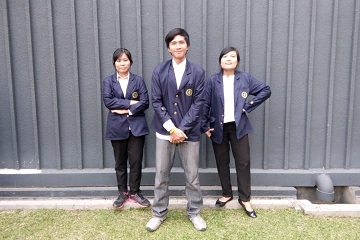This Sidewalk Flower Proved to Lower the Dangerous Metal Content of River Water up to 73.1 Percent

The availability of clean water in Indonesia is disrupted as a result of the pollution of the source of water reservoir, which is the river. Based on data from the Directorate General of Pollution Control and Ministry of Environment and Forestry (2015), rivers in Indonesia have been polluted by heavy metals up to 68 percent. Not only in Java, the problem of water pollution by heavy metals also occurs in several rivers on the island of Sumatra, including the Deli River and the Bengkulu River. This is certainly dangerous for both people who consume water and biota living in the river.
This fact prompted three Bogor Agricultural University (IPB) students who joined in the Student Creativity Program on research (PKM-P) to examine the potential of crops that usually exist on the roadside ie Paitan plant as bio accumulator for heavy metals. They are Ones Putra Hulu, Rezeki Sirait, and Martina Sihombing who are students from the Department of Nutrition Science and Feed Technology of the Faculty of Animal Husbandry under the guidance of Dr. Ir Didid Diapari, M.Si.
"Inspired by the plants that grow on the sidewalk, we are curious about the benefits of the plant. Then we do the research. Our results prove that Paitan plant has a property as bio accumulator, " Ones explained, Chairman of the PKM-P.
Through this idea, Ones and his team-mates received an grants from the Ministry of Research, Technology and Higher Education (Kemenristekdikti RI) to complete his research and prove whether the Paitan plant can reduce the heavy metal content in river water. Their research results show that Paitan plant is able to reduce lead weight metal (Pb) up to 73 percent.
"We hope that Paitan research can increase people's knowledge to care more about rivers and to better understand the potential of this link. For future plans, we want our results to be published in journals, including scientific competitions, and for further research material to facilitate the use of paitan. Ones and the team also hope this innovation can be produced commercially, "said Ones. (DMR).



